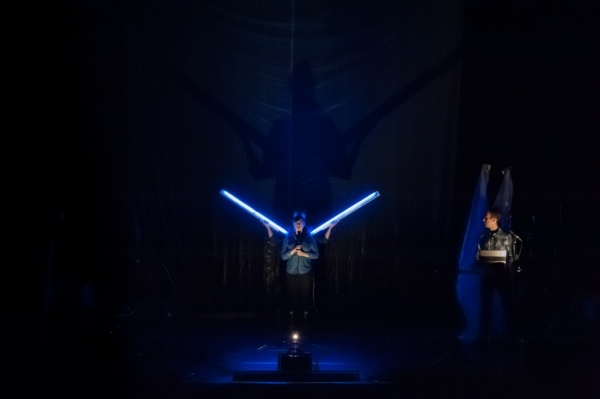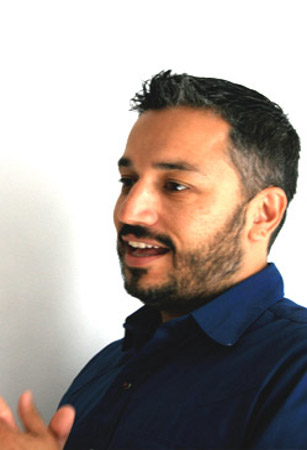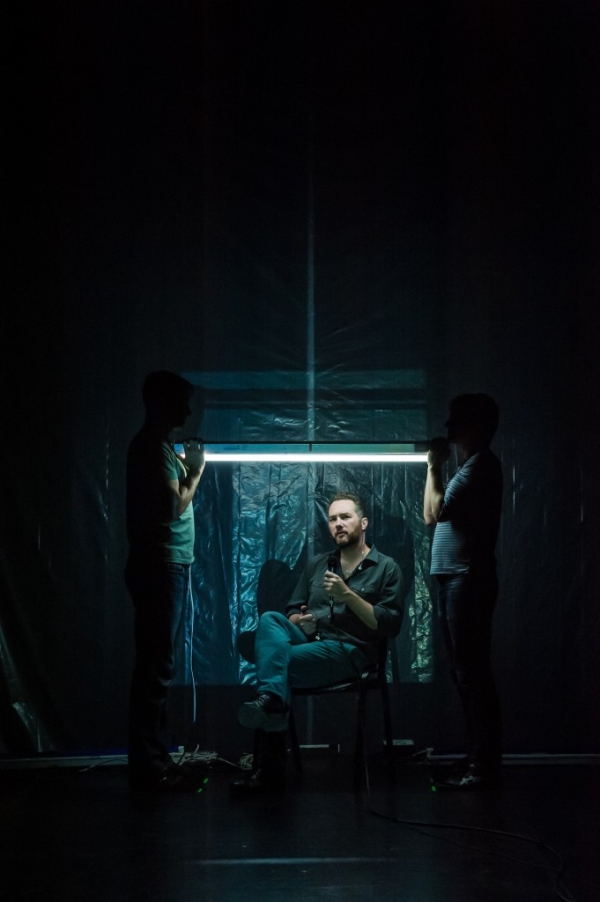Voices From Northern Mexico Come to New York City in Theater Mitu's Juárez: A Documentary Mythology
Artistic Director Rubén Polendo speaks about how the violence in his hometown has changed since he began researching this play three years ago.

(courtesy of Theater Mitu)
Behind the Henry James façade of a townhouse on Washington Square Park is a sleek, modern interior. This labyrinth of frosted glass and beige carpet is the New York headquarters for NYU's Abu Dhabi campus. In the summer months, you're likely to find NYUAD's executive director of the arts, Rubén Polendo, busy at work in his third-floor office. That's where TheaterMania found him for a recent interview.
In addition to his work with NYU, Polendo is the artistic director of Theater Mitu, a globe-trotting experimental theater company that has performed in places as disparate as Beirut, Abu Dhabi, and Ulaanbaatar, Mongolia. Mitu's latest project, Juárez: A Documentary Mythology (set to play Rattlestick Playwrights Theater this September as part of Theater: Village 2014), takes place in Polendo's hometown on the U.S.-Mexican border — a place that has been plagued by violence in the last decade, much of it stemming from a war between rival drug cartels.
"When you arrive into the El Paso airport, the first things you hear is, 'Welcome to El Paso, Texas, rated the safest city in the United States,' and it's right across the river from what was, until recently, the murder capital of the world," Polendo said about the disparity between Juárez and its sister city across the Rio Grande. "How could that be?"
Theater Mitu has spent the last three years trying to answer that question. TheaterMania spoke to Polendo about the piece, his process, and the lessons he's learned along the way.

(courtesy of Theater Mitu)
Why did you want to present a play about Juárez?
I was raised there and I make frequent trips back to see my family. The park where I grew up playing in had been closed because there was a huge shooting there. This old movie theater in the neighborhood is shut down and full of bullet holes…Everything changed right under my nose. A place that was my home became foreign to me. I approached the company about this crisis in my hometown. They're my artistic family, so I wanted them to help make sense of this for me.
How did you begin your process?
This is a piece that is truly constructed by the company. There aren't the divisions of actor and director. Our first journey as a company to Juárez was to figure out if we had a place in the conversation at all, rather than trying to be parasitic on it. We all went in as researchers. We got a sense that people wanted their voices heard, as opposed to the news headlines, so we began a series of interviews.
How did you go about selecting your subjects?
We really wanted a group that spanned class, gender, age, and livelihood. We started with people my family knows, but what started happening was this contiguous effect where we would speak with someone and they would introduce us to several other people…Some of the most important interviews came from people who weren't originally on our radar.

(courtesy of Theater Mitu)
Did you ever feel in danger during your field work?
All the time. We did an interview in a café, [and later, when] we were watching the news there had been a huge shooting in that café the next day. We had been right there. I saw in that moment how foreign I was to that landscape and the responsibility I had to the whole company. I don't think we could have done this were it not for the longstanding artistic relationships we have forged as a company. They were really tested.
What is a "documentary mythology"?
We include the word "mythology" to recognize the stories a culture tells itself to pass on its belief systems, to stay alive, and to stay healthy. There's no conversation about Juárez that doesn't include memories of how things were before. Everyone really lives on those memories. It was important for us to represent them. We also make sure to include many different perspectives. There are voices in this piece that I disagree viciously with…But they are voices of Juárez, and we wanted to represent them onstage.
So how do you do that?
We realized the only way we could do this piece was through the words of the people we spoke with. That led to using the text from our interviews. The piece is not about characters and scenes. The actors all have their dialogue transmitted through earpieces. It's all being fed by other actors or read or projected. My hope is that the actors will really be seen as transmitters.
What was it like to premiere this play in Juárez?
That was an incredible experience. It was terrifying to be in this theater with these faces who are living the story looking at us. The response was overwhelmingly positive. We were able to sit proudly on the theatrical conversation we were having. In each version we've had, whether it's a workshop or production, it has changed and it will continue to as we rehearse it here in New York.
After three years of research, do you understand the situation in Juárez any better?
I got to understand my father in a whole new way. He's eighty-five now. His life is much more complicated than I realized and it's tethered to that city. He's a major voice throughout the piece. He's a car mechanic, but he's secretly an artist and I think he sees the world that way. Once we were watching all these old family movies…I asked him, "Is it ever going to go back to that?" He said, "Juárez is the story of every city that has ever been abused by progress." I thought that was such a devastatingly eloquent statement. As the company travels all over the world, we see the inflections of progress and the violence it can bring. That's actually what this story is about…I'm very grateful to my father for giving us that perspective.
Click below to see a trailer for Juárez: A Documentary Mythology:
JUÁREZ: A Documentary Mythology Trailer from Theater Mitu on Vimeo.









